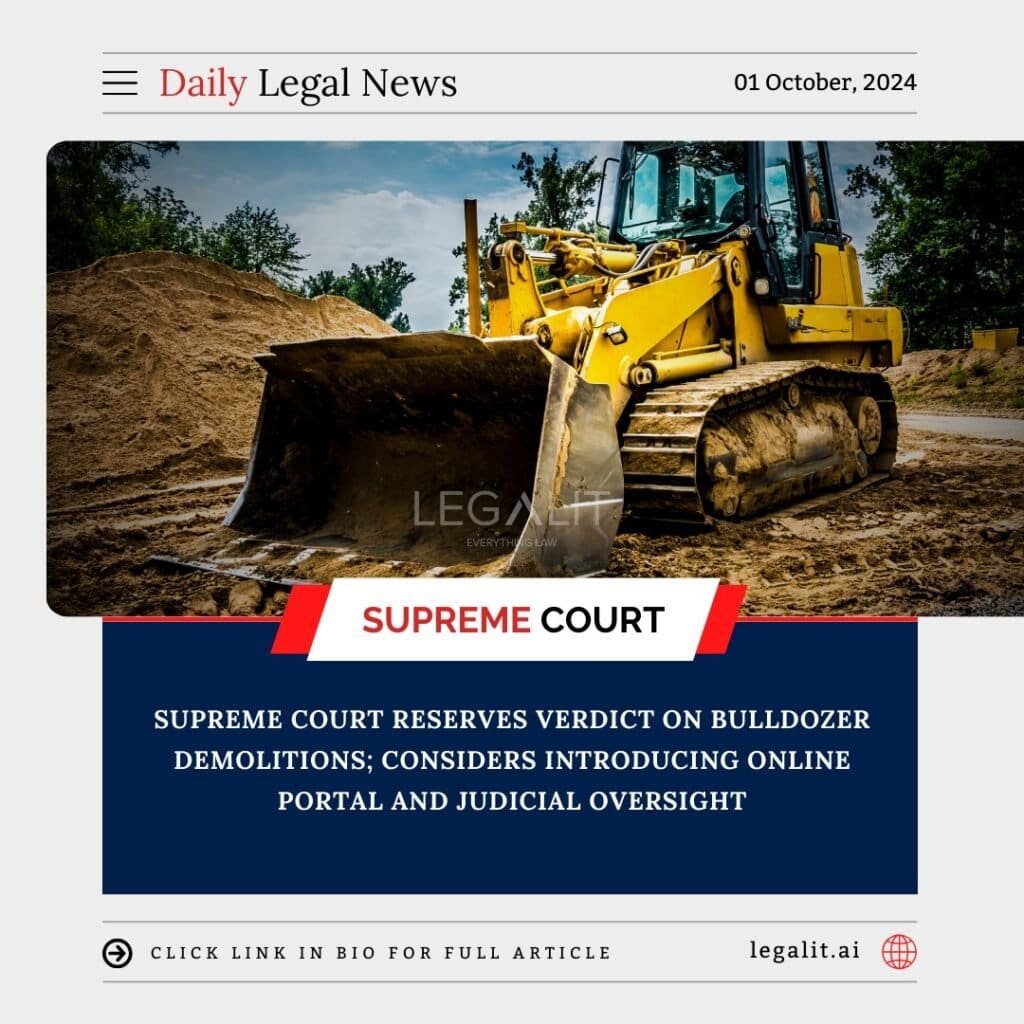
The Supreme Court of India has reserved its decision regarding the controversial practice of bulldozer demolitions, often conducted as part of anti-encroachment drives. In response to growing public concern over the legality and fairness of such actions, the Court is considering measures to introduce an online portal and judicial oversight to ensure transparency and accountability in demolition processes.
The Controversy Around Bulldozer Demolitions
Bulldozer demolitions have become a topic of intense debate, with authorities justifying these actions as necessary for removing illegal structures and reclaiming public land. However, critics argue that the process is frequently arbitrary, targeting marginalized communities and serving as a punitive measure without following due process. Many affected individuals claim they received little or no notice before their homes or businesses were demolished, raising significant concerns about violations of fundamental rights and the misuse of executive power.
Several petitions have been filed in the Supreme Court challenging these demolitions, highlighting cases where actions were taken without proper notice or an opportunity for affected parties to present their case. These petitions argue that such demolitions are not only unjust but also undermine the constitutional rights of citizens.
Judicial Oversight: A Measure to Ensure Fairness
In light of these concerns, the Supreme Court is considering implementing judicial oversight over demolition drives to ensure that authorities act within the bounds of the law. Judicial oversight would require a review of the legality of demolition orders before they are carried out, helping to prevent arbitrary actions and ensuring that affected individuals are given sufficient notice and the opportunity to contest the action.
The introduction of judicial oversight would provide an additional layer of accountability, helping to uphold the rule of law and protect citizens’ fundamental rights. It also aims to create a system that ensures demolition actions are necessary, lawful, and conducted in a manner that respects the rights of affected parties.
Proposal for an Online Portal for Transparency
Another measure being considered by the Supreme Court is the establishment of an online portal where information about demolition drives can be made publicly available. This portal would include details such as the reasons for demolitions, the status of notices served, and any ongoing legal proceedings. Such transparency would not only help those directly affected but also allow the public to hold authorities accountable for their actions.
The online portal could be instrumental in ensuring that due process is followed, providing a centralized platform for accessing information about upcoming demolitions and the procedures to contest them. It would also help to address concerns about selective targeting, as the details of each demolition would be openly available for public scrutiny.
Implications for Citizens’ Rights and Executive Accountability
The Supreme Court’s intervention in the matter comes amid widespread criticism of the bulldozer demolitions and their impact on marginalized communities. The proposed judicial oversight and online portal could help address these concerns by ensuring that demolitions are conducted in a fair, transparent, and lawful manner.
These measures could also set a precedent for how anti-encroachment drives are conducted in the future, ensuring that the rights of citizens are upheld while balancing the need for urban regulation. The Court’s decision will be crucial in determining how far executive powers can go in carrying out demolitions and whether affected individuals have adequate recourse to protect their rights.
Balancing Regulation and Fundamental Rights
The Supreme Court’s deliberations reflect the need to balance urban regulation with the protection of fundamental rights. Anti-encroachment drives are necessary for maintaining public order and ensuring compliance with urban planning regulations. However, they must be carried out in a manner that respects the rights of individuals, particularly those from vulnerable communities.
By considering judicial oversight and transparency measures, the Supreme Court aims to establish a framework that prevents misuse of power and ensures accountability. These proposed steps are critical for protecting the principles of natural justice and preventing arbitrary actions by authorities.
Conclusion
The Supreme Court’s decision to reserve its verdict on bulldozer demolitions, while considering judicial oversight and an online portal, is a significant step towards ensuring fairness and transparency in anti-encroachment drives. These measures aim to safeguard citizens’ rights, provide a system of checks and balances, and prevent arbitrary demolitions.
The outcome of the case will have far-reaching implications for the future of urban regulation in India. By emphasizing the importance of due process and accountability, the Court is working to ensure that executive actions do not come at the expense of citizens’ rights and that the rule of law is upheld.